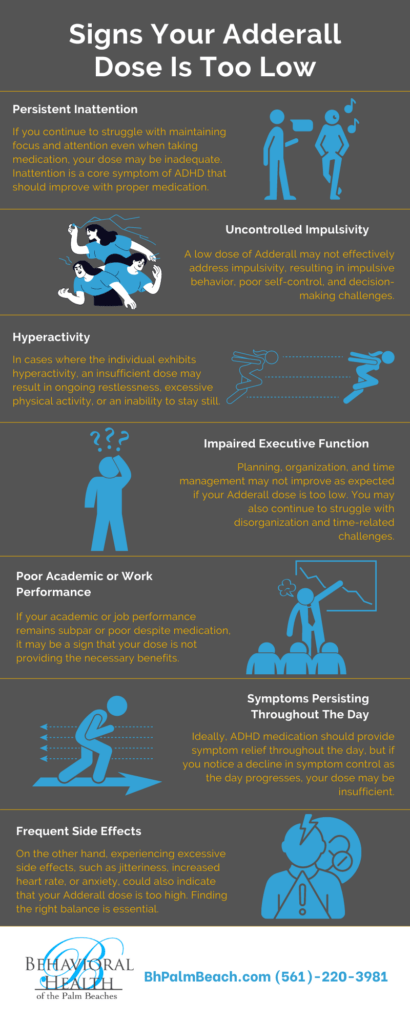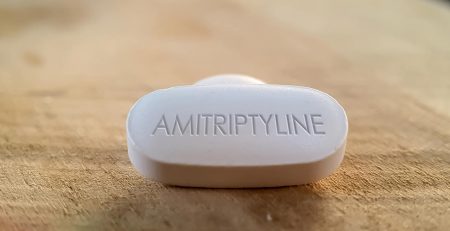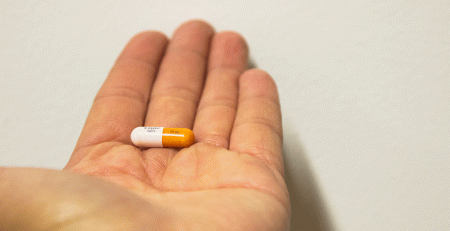Adderall is a stimulant medication commonly prescribed to treat attention deficit hyperactivity disorder (ADHD). Determining the appropriate dosage of Adderall is a critical aspect of managing symptoms effectively. Patients and healthcare providers must work collaboratively to find the dose that provides the desired therapeutic benefits while minimizing potential side effects. Similarly, identifying when an Adderall dose may be insufficient is equally important to ensure that patients receive all benefits offered by the medication. The experts at our drug rehab in Lake Worth are exploring the key signs your Adderall dose is too low, shedding light on the importance of accurate dosing in the treatment of ADHD.
How Should Adderall Make You Feel if You Have ADHD?
Adderall is an ADHD medication that contains amphetamine and dextroamphetamine salts. When appropriately dosed, Adderall should cause specific effects that contribute to the management of ADHD.
If you’re taking Adderall for ADHD, you should experience some or all of these symptoms:
- Improved focus and concentration: Adderall can enhance an individual’s ability to concentrate on and complete tasks efficiently. This heightened focus is a hallmark of the medication’s effectiveness in managing ADHD.
- Reduced impulsivity: People with ADHD often struggle with impulsivity, which can affect their ability to think before acting. Adderall can help reduce impulsivity, enabling individuals to make more conscious decisions.
- Improved attention span: One of the primary symptoms of ADHD is a short attention span. Adderall can extend this span, helping individuals with ADHD maintain their attention on tasks, even those that may not be considered stimulating.
- Enhanced organization: Many individuals with ADHD struggle with organization and time management. Adderall can facilitate better organization skills, making it easier to plan and execute tasks.
- Reduced hyperactivity: While the “H” in ADHD stands for hyperactivity, not all individuals with ADHD experience hyperactive behavior. For those who do, however, Adderall can help reduce restlessness and excessive physical activity.
Overall, Adderall should improve an individual’s ability to be productive and efficient in daily activities. However, while these are common changes that should be seen in individuals with ADHD, the specific response to Adderall can vary among individuals. The medication should be prescribed and adjusted under the supervision of a qualified healthcare provider to ensure effective care and safety.
Furthermore, the goal of taking Adderall for ADHD is not to induce euphoria or excessive stimulation but to induce a balanced and focused state that improves one’s ability to manage their ADHD symptoms and improve their quality of life. Any unusual or severe side effects should be mentioned to a healthcare provider.
Signs Your ADHD Medication Dose Is Too Low
 Determining whether your Adderall dose is too low is crucial for effectively managing your symptoms. Taking a low Adderall dose that’s not sufficient may prevent you from experiencing the desired therapeutic benefits, and your symptoms may persist or worsen.
Determining whether your Adderall dose is too low is crucial for effectively managing your symptoms. Taking a low Adderall dose that’s not sufficient may prevent you from experiencing the desired therapeutic benefits, and your symptoms may persist or worsen.
Here are clear signs your Adderall dose is too low:
- Persistent inattention: If you continue to struggle with maintaining focus and attention even when taking medication, your dose may be inadequate. Inattention is a core symptom of ADHD that should improve with proper medication.
- Uncontrolled impulsivity: A low dose of Adderall may not effectively address impulsivity, resulting in impulsive behavior, poor self-control, and decision-making challenges.
- Hyperactivity: In cases where the individual exhibits hyperactivity, an insufficient dose may result in ongoing restlessness, excessive physical activity, or an inability to stay still.
- Impaired executive function: Planning, organization, and time management may not improve as expected if your Adderall dose is too low. You may also continue to struggle with disorganization and time-related challenges.
- Poor academic or work performance: If your academic or job performance remains subpar or poor despite medication, it may be a sign that your dose is not providing the necessary benefits.
- Symptoms persisting throughout the day: Ideally, ADHD medication should provide symptom relief throughout the day, but if you notice a decline in symptom control as the day progresses, your dose may be insufficient.
- Frequent side effects: On the other hand, experiencing excessive side effects, such as jitteriness, increased heart rate, or anxiety, could also indicate that your Adderall dose is too high. Finding the right balance is essential.
It’s crucial to remember that Adderall dosing is highly individualized. Finding the right dose may require ongoing monitoring and open communication with your healthcare provider. Your doctor will consider your specific symptoms, response to the medication, and any potential side effects to make informed adjustments to your treatment plan. Never make any changes in your dose without the consent of your doctor.
In addition to the consequences of a too-low Adderall dose, there are also risks of taking higher doses of Adderall without medical direction. As a stimulant and controlled substance, Adderall is recognized for both its medical uses and potential for dependence and addiction.
Long-term misuse of this medication can lead to a drug use disorder, which requires individualized treatment. Taking Adderall without a prescription can also lead to physical and legal issues, including addiction, fines, or jail time.
If you or someone you care about has become addicted to Adderall or any other medication, our prescription drug treatment can help. Our drug rehab in Palm Beach County offers a wide range of addiction services, including comprehensive care to help individuals addicted to their medication.













